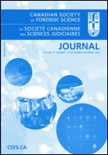
Canadian Society of Forensic Science Journal
Scope & Guideline
Fostering Innovation in Forensic Pathology and Medicine
Introduction
Aims and Scopes
- Forensic Biology and Entomology:
The journal frequently publishes studies related to forensic biology, including entomology, which examines the role of insects in decomposition and crime scene investigations. This includes research on blow flies and their behavior in various environments. - Forensic Anthropology and Human Identification:
Research focusing on the physical characteristics of human remains for identification purposes, including sex, age, and stature estimation from skeletal remains is a core area. The journal explores methodologies such as metric analysis and the use of advanced imaging techniques. - Toxicology and Substance Analysis:
There is a consistent focus on toxicology, particularly the analysis of substances involved in criminal cases, including drugs and alcohol. Studies examine the effects of these substances and their implications in forensic contexts. - Forensic Evidence Examination and Analysis:
The journal includes papers on the examination and analysis of various types of forensic evidence, such as fingerprints, fibers, and ballistic evidence, emphasizing the importance of reliable methodologies in forensic investigations. - Legal and Ethical Perspectives in Forensic Science:
The journal also addresses the intersection of forensic science with legal practices, exploring issues like the admissibility of evidence and the role of expert witnesses in court.
Trending and Emerging
- Advanced Imaging Techniques in Forensics:
There is an increasing emphasis on the use of advanced imaging technologies, such as cone beam computed tomography, for age estimation and other forensic applications. This trend suggests a move towards more precise and non-invasive methods. - Molecular and Genetic Forensics:
Research focusing on genetic profiling and DNA analysis is gaining traction, with studies exploring innovative methods for generating DNA profiles from unconventional sources, such as blood ingested by leeches. - Environmental and Ecological Forensics:
Emerging themes include the study of environmental factors affecting forensic investigations, such as the effects of terrain on insect dispersal and the implications of decomposition in different ecosystems. - Interdisciplinary Approaches to Forensic Science:
There is a growing trend towards interdisciplinary collaboration, integrating fields such as anthropology, toxicology, and even legal studies to enhance forensic methodologies and applications. - Forensic Applications of Technology and Software:
The increasing use of software tools for data analysis in forensic contexts, such as gunshot residue analysis and footwear impression databases, signifies a shift towards technology-driven research in forensic science.
Declining or Waning
- Traditional Forensic Methods and Techniques:
There seems to be a waning interest in traditional forensic methods that do not integrate newer technologies or interdisciplinary approaches. This shift reflects a broader move towards more innovative and effective techniques. - General Crime Scene Investigation Protocols:
Research that simply reiterates established crime scene investigation protocols without introducing new perspectives or findings appears to be declining. The journal is likely favoring studies that offer novel insights or significant advancements. - Non-Scientific Perspectives on Forensic Issues:
Papers that primarily focus on sociological or psychological perspectives without a strong forensic science component are becoming less frequent, indicating a preference for more empirically driven research.
Similar Journals
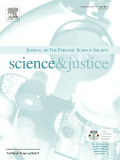
SCIENCE & JUSTICE
Unraveling Truth at the Intersection of Science and Law.Science & Justice is a leading international journal published by Elsevier Science Ltd, dedicated to the interdisciplinary examination of the intersection of justice and science, especially within the realms of forensic science and pathology. Established in 1995, this reputable journal has garnered a commendable Q2 rank in the category of Pathology and Forensic Medicine, reflecting its significant contributions to advancing knowledge in these critical fields. With an ISSN of 1355-0306 and an E-ISSN of 1876-4452, the journal is indexed in Scopus, positioning it in the top 68th percentile among its peers. The objectives of Science & Justice include promoting research that bridges scientific methodologies with justice-related applications, making it an invaluable resource for researchers, professionals, and students alike. As the journal continues to evolve, it aims to interface scientific innovations with forensic practices, thereby enhancing the integrity of justice processes globally. Despite not offering Open Access options, it remains a pivotal reference point within the academic community focused on forensic science methodologies and their legal implications.

Journal of Forensic and Legal Medicine
Championing Excellence in Forensic and Legal Research.The Journal of Forensic and Legal Medicine, published by Elsevier, stands at the forefront of interdisciplinary research in the overlapping domains of law, medicine, and forensic science. With an ISSN of 1752-928X and an E-ISSN of 1532-2009, this esteemed journal covers pivotal advancements in the field, spanning from 2007 to 2024. The journal enjoys a distinguished reputation, evidenced by its Q1 ranking in Law and its notable positions in the Scopus Ranks with an 82nd percentile in Social Sciences—Law. As a crucial resource for researchers, practitioners, and students alike, the journal focuses on the vital role of forensic evidence in legal contexts, ensuring the dissemination of high-quality, peer-reviewed articles that contribute to both academic and practical applications in the realm of forensic and legal medicine. Its accessibility to a broad audience, despite not being open access, bolsters its importance in advancing forensic science, policy-making, and medical jurisprudence worldwide.

Forensic Science International Genetics Supplement Series
Enhancing legal outcomes with genetic breakthroughs.Forensic Science International Genetics Supplement Series, published by Elsevier Ireland Ltd, is an essential resource for professionals, researchers, and students engaged in the increasingly critical intersection of genetics and forensic science. This peer-reviewed journal, with an ISSN of 1875-1768 and E-ISSN of 1875-175X, provides a platform for disseminating innovative research findings and methodologies that enhance the application of genetic techniques in forensic investigations. The journal has gained recognition within the academic community, evidenced by its notable rankings in Pathology and Forensic Medicine as well as Genetics, placing it in Q3 and Q4 quartiles respectively in 2023. Although it operates without an open access model, its targeted converged years—spanning from 2008 to 2022—exemplify a commitment to fostering ongoing advancements in forensic genetics. Despite its positioning, the journal remains a significant contributor to public discourse, with an emphasis on the role of genetics in legal contexts and the continual evolution of forensic methodologies.

Forensic Imaging
Fostering breakthroughs in forensic evidence analysis and application.Forensic Imaging is a premier international journal dedicated to advancing the field of forensic science through the analysis and implementation of imaging techniques. Published by ELSEVIER, this open access journal provides a platform for researchers, professionals, and students to disseminate innovative studies that bridge the disciplines of Pathology, Forensic Medicine, and Radiology. Since its inception in 2020, it has gained recognition and holds a respectable Q3 ranking in its categories for both Pathology and Forensic Medicine and Radiology, Nuclear Medicine and Imaging, reflecting its commitment to high-quality, impactful research. The journal's practical focus on imaging methodologies offers valuable insights into forensic investigations and enhances professional practices, making it an essential read for those involved in forensic research and application. Available in both print and online formats, Forensic Imaging serves as a vital resource for fostering breakthroughs in the analysis of forensic evidence.
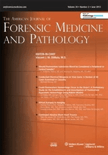
AMERICAN JOURNAL OF FORENSIC MEDICINE AND PATHOLOGY
Advancing the Science of JusticeThe American Journal of Forensic Medicine and Pathology is a pivotal publication within the field of forensic science and pathology, dedicated to disseminating influential research and advancements in the evaluation of death and injury in legal contexts. Published by Lippincott Williams & Wilkins, this journal, which has been in circulation since 1980, serves as a vital resource for professionals, researchers, and students focused on intersecting disciplines such as medicine and forensic investigations. While it holds a respectable Q3 ranking in both the Medicine (Miscellaneous) and Pathology and Forensic Medicine categories as of 2023, the journal's impact is underscored by its contributions to the ongoing dialogue on forensic practices and methodologies. The American Journal of Forensic Medicine and Pathology provides a platform for innovative papers that shape the future of forensic science, also offering insights through case studies, reviews, and research articles that cater to its diverse readership. With an ISSN of 0195-7910 and E-ISSN 1533-404X, the journal continues to support the scholarly community in advancing knowledge within this critical field.
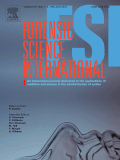
Forensic Science International
Pioneering Discoveries in Forensic Medicine and LawForensic Science International is a premier journal published by Elsevier Ireland Ltd, dedicated to advancing the field of forensic science through interdisciplinary research and scholarship. Since its inception in 1978, this esteemed journal has provided a platform for vital research, receiving recognition in the Q1 category for both Law and Pathology and Forensic Medicine as of 2023, underscoring its significant impact in these domains. It currently ranks 54th out of 1025 journals in Social Sciences - Law and 51st out of 208 in Medicine - Pathology and Forensic Medicine, placing it in the top echelons of academic journals according to Scopus metrics. Forensic Science International transitioned to Open Access in 2019, ensuring that critical findings are widely available to the global research community and enhancing collaboration among forensic professionals. With a forward-looking scope that evolves to meet the challenges and innovations of forensic science, this journal remains a pivotal resource for researchers, practitioners, and students who are committed to the continued advancement of forensic science and its applications in legal contexts.

International Journal of Medical Toxicology and Forensic Medicine
Advancing the Frontiers of Toxicology and ForensicsInternational Journal of Medical Toxicology and Forensic Medicine, published by Shaheed Beheshti Medical University of Medical Sciences & Health Services, is a pioneering platform dedicated to advancing knowledge within the critical fields of toxicology and forensic medicine. Established as an Open Access journal since 2011, it ensures wide dissemination of research findings, catering to a global audience of researchers, healthcare professionals, and students. With an ISSN of 2251-8762 and an E-ISSN of 2251-8770, the journal covers a diverse range of topics relevant to the medical community, albeit being categorized as Q4 in both Pathology and Forensic Medicine and Toxicology in 2023, indicating emerging significance in these disciplines. Geographically based in Tehran, Iran, it aspires to bridge gaps in scientific research and practice, particularly in regions where such expertise is critical. The journal welcomes submissions that investigate pressing issues in medical toxicology and forensic science, fostering an interdisciplinary dialogue essential for innovative solutions and improved public health outcomes.
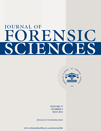
JOURNAL OF FORENSIC SCIENCES
JOURNAL OF FORENSIC SCIENCES is a premier publication dedicated to advancing the field of forensic science through high-quality research and innovation. Published by Wiley, this journal has been a reliable source of cutting-edge findings since its inception in 1961, with a continued commitment to excellence expected through 2024. With an ISSN of 0022-1198 and an E-ISSN of 1556-4029, the journal covers critical aspects of forensic medicine, including genetics, pathology, and molecular biology. Notably, it holds a Q2 ranking in Pathology and Forensic Medicine, reflecting its high impact and relevance in the field. Researchers and professionals benefit from comprehensive access to groundbreaking studies and discussions that drive advancements in forensic methodologies and technologies. While not an open access journal, its impact factor and rigorous peer-review process ensure that every article contributes significantly to the body of forensic science knowledge. Whether you are a seasoned forensic expert or an aspiring student, the JOURNAL OF FORENSIC SCIENCES serves as an essential resource for cutting-edge research and discoveries.

MEDICINE SCIENCE AND THE LAW
Transforming Health Law Through Rigorous ResearchMEDICINE SCIENCE AND THE LAW is a prestigious journal published by SAGE PUBLICATIONS INC, focused on the intersection of law, health policy, and ethical issues as they pertain to medicine. With a long-standing history dating back to 1960, this journal has become a crucial platform for scholars and professionals alike to share and disseminate research that shapes the evolving legal landscape surrounding health care practices. It holds notable positions in the academic community, ranking in the Q3 category for Health Policy and Issues, Ethics and Legal Aspects, and achieving a distinguished Q1 ranking in Law as of 2023. With rigorous peer-review standards and a commitment to publishing high-quality research, MEDICINE SCIENCE AND THE LAW is invaluable for those exploring the critical legal challenges and ethical dilemmas faced within the healthcare sector. Research contributions are vital for informing policy and practice, ensuring that the journal remains a relevant and essential resource for researchers, practitioners, and students dedicated to the intersection of law and medicine.

JOURNAL OF FORENSIC PSYCHIATRY & PSYCHOLOGY
Connecting Clinical Expertise with Legal ChallengesJOURNAL OF FORENSIC PSYCHIATRY & PSYCHOLOGY, published by Routledge Journals, Taylor & Francis Ltd, is a pivotal platform for advancing knowledge at the intersection of psychology, psychiatry, and the legal system. With an ISSN of 1478-9949, this esteemed journal has been providing a critical forum since its inception in 2003, continuing through to 2024, to foster interdisciplinary dialogue among researchers, clinicians, and legal professionals. The journal holds a Q3 category ranking in both Clinical Psychology and Psychiatry and Mental Health, reflecting its important contributions to the field. With a focus on empirical research, theoretical perspectives, and case studies, it aims to enhance the understanding of forensic issues while ensuring ethical considerations in psychological assessments and interventions. Although it currently does not provide open access, the journal's rigorous peer-review process assures high-quality publications. Researchers looking to stay at the forefront of forensic psychology will find this publication indispensable for their scholarly work and practical applications.